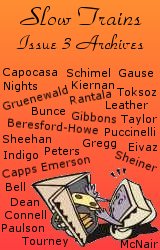
Traveling Clothes
by Thaisa Frank
I decided to see my second husband when I went to visit New York after
living in California for fifteen years. He had been a drug dealer and
became so rich he retired at forty-one. It pissed me off. Aaron had
retired
while I was busting my butt to make a life. The situation upset me.
What
if he had turned square and played golf? Or what if I, who had stuck
with making pottery, looked hapless? There were other things I didn't
think
about either -- like the fact that Aaron and I had gotten married and I
had
forgotten about it until one night it floated up in a dream.
"Forgotten? How could you have forgotten?" This from
my current husband.
"I don't know. I just forgot, and then one day I
remembered. Marriage is like that. It seems interchangeable. Except
for
you."
"What do you mean?"
"I mean I could never forget."
I called Aaron to tell him I was coming to New York and didn't mention the
fact
that I was married or had a child. What my mother
would call a stable life.
Aaron didn't sound retired at all. He sounded charming. "I'll be happy
to
see you," he said. "So very very happy."
I went to a local bookstore and bought him all three volumes of The
Genesis
of Fire. Nothing was too good for him, I thought, as I hid the books
from
my husband.
Aaron met me in the lobby of my Greenwich Village hotel wearing a
fedora, just like he'd worn when he was a drug dealer. He still
reminded me
of Dashiel Hammett. We smiled, crackling blue electricity between us,
and
as we walked towards Soho, the night rose about us -- festive,
redolent
with air of countries we'd always wanted to visit, where dust was red
as
blood and buildings faded rose. Were we ever married? I wanted to
ask
him. Tell me, Aaron. Were we? I held his arm, and we walked through
the
reckless night until we found a bar that served tapas. I ordered a
glass of
red wine and Aaron ordered Italian sparkling water. Aaron was in AA.
"Are you happy?" he asked, raising his glass.
Yes," I said. And then I said, "Aaron: Guess what? I'm married."
"Really?" he said, as though I had told him the tapas bar was
growing
flowers.
"Yes," I said, waiting for him to tell me I was a bigamist.
He didn't. He drank some water. His eyes looked sad in a blank and
hooded
way.
"Are you married?" I asked him. "Oh no," he said. "Women are too nice
for
that."
I showed him pictures of my son, who was eight, studied karate and had
been
photographed wearing a headband. In one photo my son was wearing a
mask. I
could almost see his piercing eyes watching me in the tapas bar with
Aaron.
"I've worked hard," I said, putting the picture away, "I've worked
hard to
make a life."
"I'm proud of you," said Aaron. "And I'm sorry we never went
to India."
"Did we go anywhere else?"
"No. We always stayed here. Except for Block Island."
"We went to Block Island?"
"Yes. Don't you remember? We brought a suitcase of frozen steaks on
the
train. They'd thawed by the time we got there."
It was only time Aaron ever acknowledged that we had a past. I
gave him Genesis of Fire. He seemed sad that he hadn't brought me
anything.
I'd forgotten what happened to the air when we were together. It could
blow
us to Babylon on a flying carpet. It could blow us into a bedroom.
But Aaron didn't ask me to his apartment -- no longer a walk-up we'd
shared
in the Village, but a loft that had been owned by a painter.
"It's in a constant state of disrepair," he said, when he dropped me
off at
the hotel. "Otherwise I'd love to have you to dinner." I wondered if
it had
a false floor, concealing bundles of marijuana, the way our other
apartment
did. And I wondered who, besides Aaron, was living there.
"You really don't work anymore?" I asked
"Yes. I made a bundle. So I quit."
I was going to an artists' colony in Vermont, and would come back to
New
York to visit gallery owners in New York. I'd brought clothes for my
trips
to these galleries, clothes my son called "lady clothes," even though
I'd
tried to make them hip -- a crimson skirt, a dark jacket, a black velvet
dress. They felt alien and cumbersome.
"Would you mind keeping some of these for me?" I asked Aaron, not ever
sure
if he had a closet.
He said of course, that it would be a pleasure, that it would be like
living
with me all over again.. We took a cab to the Port Authority Bus
terminal.
I handed him a suitcase, and had a tugging, melancholy sense of his
apartment. It was so nice to see you, I wrote from
Vermont, and so nice of you to keep my clothes. As I wrote, I
remembered Aaron at the Port Authority bus terminal. Quick
kisses. Promises to visit. Dust that could blow him to Vermont.
Aaron brought the suitcase as soon as I got back. Thank God, I
thought, not knowing why. "I would ask you over," he
said again, "but my apartment is in a state of disrepair. Constant
disrepair," he added. A feeling of being unruly."
"Really, it's okay," I said kissing him. And then I stashed the
suitcase in my hotel closet where it looked innocent until I opened it and it yielded just
one blouse.
"I didn't see a jacket or a dress," said Aaron, when I called him. "In
fact,
I have a distinct memory of only one hanger."
"A hanger? There wasn't any hanger. I gave you everything in the black
suitcase."
"But I saw a hanger. It was outside the suitcase."
"What was on it?"
"The blouse," said Aaron.
"But that was inside."
"But there were hangars."
"How many?"
"I don't know."
"Well I couldn't put a dress and a jacket on the same hanger. Anyway
-- I have to have that dress. Like today."
There were several such calls. We talked about dishonest cab drivers,
our precipitous rush to the Port Authority, what a nuisance it was to
have
clothes, and why I might have hung them up, after all, even if I
didn't
remember their being on hangars. The existence of the clothes receded,
became metaphysically problematical. The heady air blew around us. Our
speculations grew baroque. I remembered similar discussions we'd had
years
ago: the merits of covering the false floor with pine board or oak;
whether
black bean soup was better than white, or tiny stitches for hemming
marijuana
bundles were preferable to big ones. Was it proper to say
the Rowan tree, or would it be better to call it by its common name
which
neither of us could remember?
It was the cocaine that did him in, I thought. It was the cocaine and
his trip to India . And all at once, I said to him: "Hey, Aaron were
we
ever married?"
He laughed. "You know the answer to that one."
"No," I said. "I don't."
"Well who knows the answer to anything?" he said.
"Whatever. Just go look in your closet."
"Believe me, I've looked. I've turned everything upside-down."
"Please
do it again. They're my only grown-up clothes."
Aaron put down the phone and went to his closet. I heard the clattering
of
metal. Were the clothes themselves in bondage? Was he into chains?
"I found nothing," he said
when he came back.
"Can I come over and look?"
"I'm embarrassed to tell you my house is a mess."
At seven the next morning Aaron called. "The jacket
fell out of the closet," he said. "Literally. I opened the door and it
just
fell out. It was like it leapt."
"My God! Was there a belt?"
"Yes!"
"And the dress?"
"Not yet."
"I'll come over and get them right away."
"No. Let me come to you."
I did. Aaron arrived four hours later, an hour before I had to go to
the
first gallery. The jacket was crumpled but passable. I raced out and
bought a pair of black leggings. But the gallery owner was an owlish
man in
a dark blue suit.
I'm all wrong, I thought. I'm all wrong. I wish I were wearing my
dress. He
took me to lunch and I rolled up my sleeves trying to look
casual. I wanted my dress more than an exhibit. And as we talked, I
could see the dress, buried under another false floor, perfumed with
marijuana. The gallery owner shook my hand. He said he might like
to show my work and I thanked him, still thinking
about
my dress.
Three hours later, mysteriously, in another part of the
city, I
entered a store thick with incense and found a dress almost like the
one
Aaron had lost. This dress was longer. The muted pattern was the same.
"Do you have it in a shorter
version?" I asked. "I gave it to a friend and he lost it. The one he lost
was short."
"Not shorter," he said. "But if you buy longer and he finds
shorter, you do not repeat. Anyway, I'll take off fifteen dollars."
I wore the dress out of the store. A dress of redemption. A dress of velvet
dust.
"How in the world could he have lost your dress?" asked my
husband, when I came home. "Things don't disappear in closets." He was
holding one of my scarves. He twirled it and looked at me.
"Do you suppose Aaron wore it?" he asked.
"Never," I said.
"Are you sure?" He dangled the scarf and made it float. And then I
remembered a day and an evening when I wore one of Aaron's fedoras and
Aaron
wore my purple dress with thin straps and embroidered umbrellas. Was it
possibly the day we'd gotten married? Later we had gone to a party
where
Aaron did an Isadora Duncan dance using one of the hostesses' scarves,
which fell into a punch bowl. I had also worn a necktie.
"Well?" said my husband, catching me short.
"It might have happened," I said. "Sometimes we swapped clothes."
Like several things between Aaron and me, the swap wasn't even. When
Aaron
wore my clothes they became creased and stretched and
like wrinkled skin. But his clothes were big on me, so when I took them
off
it was like I'd never worn them.
"What happened to this dress?" said
Marvin
Linski, when I brought it in to his shop to be re-sized.
"A friend of mine wore it."
"You call this a friend?" said Marvin. He was a thin, intelligent man,
with
blue numbers tattooed on his arm. In order to survive the camps he'd
learned X-ray vision: I was sure he knew who'd been wearing the dress.
I
was sure he saw the scarf fall in the punch bowl.
"Promise me you'll never let this friend wear your clothes again. I
won't
clean it unless you do."
"I loved that dress," said my husband. "I'm sorry you don't have it
anymore."
"What about the longer one? Don't you like it?"
"That other dress was short. When you wore it with red tights it was a
knock-out."
After he said this, he sat the living room couch drinking wine. Because
he
wasn't an alcoholic, like Aaron, he was able to drink half a bottle
without
blinking. It was very old red wine, and left sediment at the bottom of
the
glass. He swirled his fingers in the sediment and said, "Now some
creepy
drug dealer is wearing your velvet dress."
I almost told my husband what had happened the last day I saw Aaron.
We were at an espresso shop for pastries and Aaron told me he
hennaed
his hair. "I look younger than anyone I know. So why not keep it that
way?"
Then he'd stuck his tongue out at me, which had an extraordinary
number of cracks in it, and suddenly began to began to fall apart like a
piece of
old
parchment. He no longer looked like Dashiel Hammett. I was sure he
had
the dress. And I was sure we were married and bound in a love-knot
forever.
"What are you thinking?" my husband asked.
"I don't really know," I said. "Maybe about the air that blew me to
this
living room."






